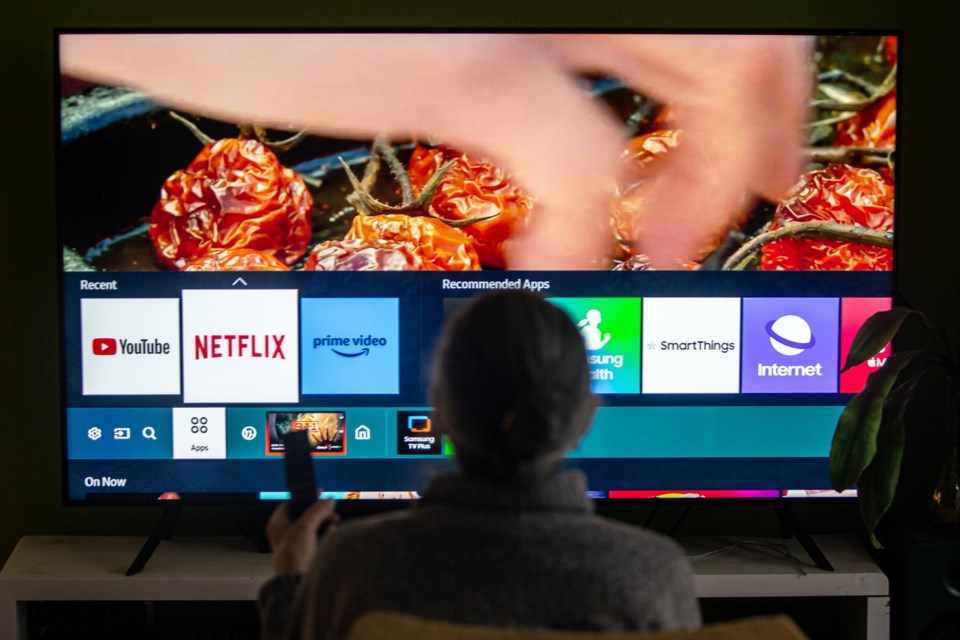OTTAWA — Some of the world’s biggest streaming companies will argue in court on Monday that they shouldn’t have to make CRTC-ordered financial contributions to Canadian content and news.
The companies are fighting an order from the federal broadcast regulator that says they must pay five per cent of their annual Canadian revenues to funds devoted to producing Canadian content, including local TV news.
The case, which consolidates several appeals by streamers, will be heard by the Federal Court of Appeal in Toronto.
Apple, Amazon and Spotify are fighting the CRTC’s 2024 order. Motion Picture Association-Canada, which represents such companies as Netflix and Paramount, is challenging a section of the CRTC's order requiring them to contribute to local news.
In December, the court put a pause on the payments — estimated to be at least $1.25 million annually per company. Amazon, Apple and Spotify had argued that if they made the payments and then won the appeal and overturned the CRTC order, they wouldn’t be able to recover the money.
In court documents, the streamers put forward a long list of arguments on why they shouldn’t have to pay, including technical points regarding the CRTC’s powers under the Broadcasting Act.
Spotify argued that the contribution requirement amounts to a tax, which the CRTC doesn’t have the authority to impose. The music streamer also took issue with the CRTC requiring the payments without first deciding how it will define Canadian content.
Amazon argued the federal cabinet specified the CRTC’s requirements have to be "equitable."
It said the contribution requirement is "inequitable because it applies only to foreign online undertakings and only to such undertakings with more than $25 million in annual Canadian broadcasting revenues."
Apple also said the regulator "acted prematurely" and argued the CRTC didn’t consider whether the order was "equitable." It pointed out Apple is required to contribute five per cent, while radio stations must only pay 0.5 per cent — and streamers don’t have the same access to the funds into which they pay.
The CRTC imposes different rules on Canadian content contributions from traditional media players. It requires large English-language broadcasters to contribute 30 per cent of revenues to Canadian programming.
Motion Picture Association—Canada is only challenging one aspect of the CRTC’s order — the part requiring companies to contribute 1.5 per cent of revenues to a fund for local news on independent TV stations.
It said in court documents that none of the streamers "has any connection to news production" and argued the CRTC doesn’t have the authority to require them to fund news.
"What the CRTC did, erroneously, is purport to justify the … contribution simply on the basis that local news is important and local news operations provided by independent television stations are short of money," it said.
"That is a reason why news should be funded by someone, but is devoid of any analysis, legal or factual, as to why it is equitable for foreign online undertakings to fund Canadian news production."
In its response, the Canadian Association of Broadcasters said the CRTC has wide authority under the Broadcasting Act. It argued streamers have contributed to the funding crisis facing local news.
"While the industry was once dominated by traditional television and radio services, those services are now in decline, as Canadians increasingly turn to online streaming services," the broadcasters said.
"For decades, traditional broadcasting undertakings have supported the production of Canadian content through a complex array of CRTC-directed measures … By contrast, online undertakings have not been required to provide any financial support to the Canadian broadcasting system, despite operating here for well over a decade."
A submission from the federal government in defence of the CRTC argued the regulator was within its rights to order the payments.
"The orders challenged in these proceedings … are a valid exercise of the Canadian Radio-television and Telecommunications Commission’s regulatory powers. These orders seek to remedy the inequity that has resulted from the ascendance of online streaming giants like the Appellants," the office of the attorney general said.
"Online undertakings have greatly profited from their access to Canadian audiences, without any corresponding obligation to make meaningful contributions supporting Canadian programming and creators — an obligation that has long been imposed on traditional domestic broadcasters."
The government said that if the streamers get their way, that would preserve "an inequitable circumstance in which domestic broadcasters — operating in an industry under economic strain — shoulder a disproportionate regulatory burden."
"This result would be plainly out of step with the policy aims of Parliament" and cabinet, it added.
The court hearing comes as trade tensions between the U.S. and Canada have cast a shadow over the CRTC’s attempts to regulate online streamers.
The regulator launched a suite of proceedings and hearings as part of its implementation of the Online Streaming Act, legislation that in 2023 updated the Broadcasting Act to set up the CRTC to regulate streaming companies.
In January, as U.S. President Donald Trump was inaugurated for his second term, groups representing U.S. businesses and big tech companies warned the CRTC that its efforts to modernize Canadian content rules could worsen trade relations and lead to retaliation.
Then, as the CRTC launched its hearing on modernizing the definition of Canadian content in May, Netflix, Paramount and Apple cancelled their individual appearances.
While the companies didn’t provide a reason, the move came shortly after Trump threatened to impose a tariff of up to 100 per cent on movies made outside the United States. Foreign streamers have long pointed to their existing spending in Canada in response to calls to bring them into the regulated system.
This report by The Canadian Press was first published June 8, 2025.
Anja Karadeglija, The Canadian Press




